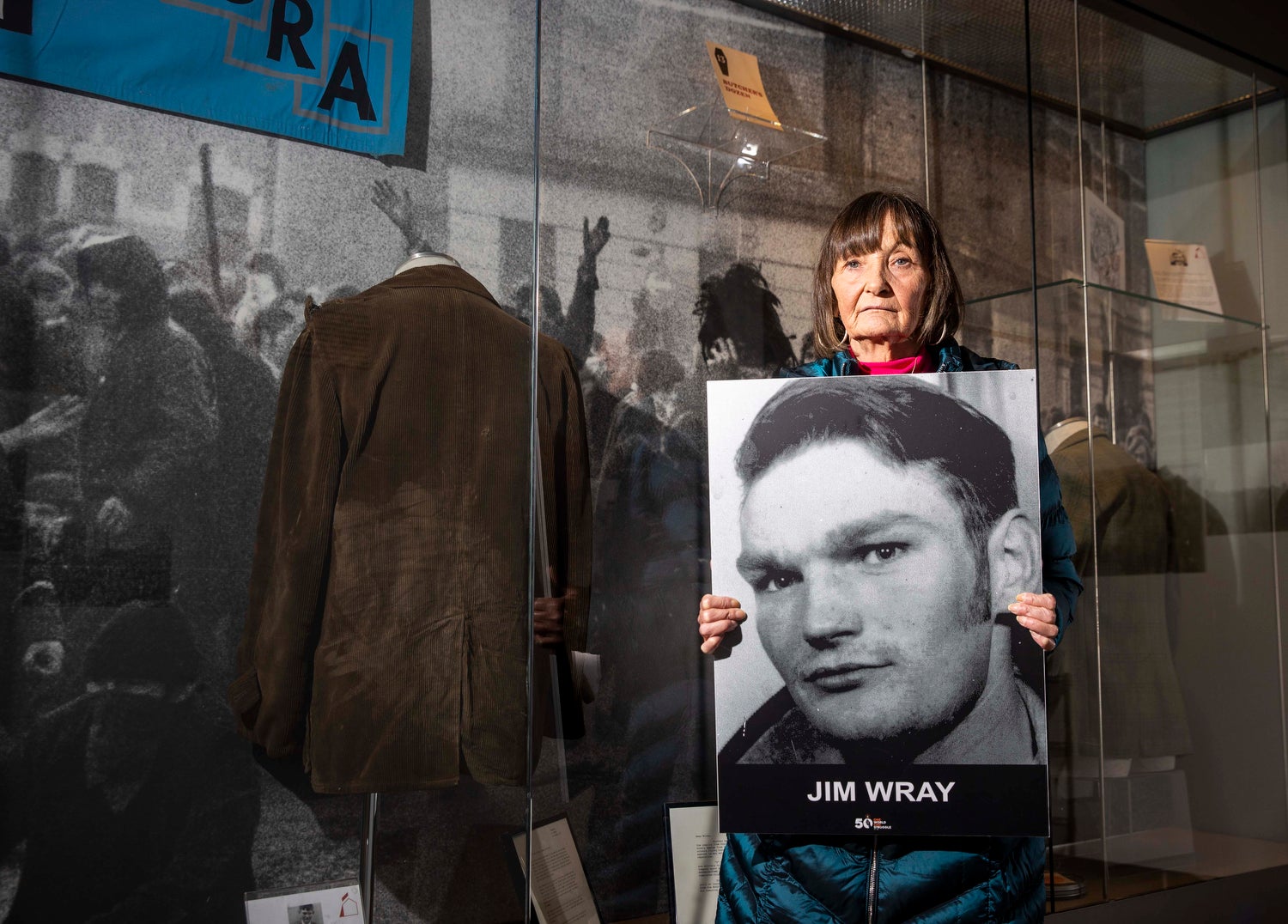Bloody Sunday victim’s sister says grief also led to death of her mother
Margaret Wray’s brother Jim was 22 when he was shot dead on January 30, 1972.

Your support helps us to tell the story
From reproductive rights to climate change to Big Tech, The Independent is on the ground when the story is developing. Whether it's investigating the financials of Elon Musk's pro-Trump PAC or producing our latest documentary, 'The A Word', which shines a light on the American women fighting for reproductive rights, we know how important it is to parse out the facts from the messaging.
At such a critical moment in US history, we need reporters on the ground. Your donation allows us to keep sending journalists to speak to both sides of the story.
The Independent is trusted by Americans across the entire political spectrum. And unlike many other quality news outlets, we choose not to lock Americans out of our reporting and analysis with paywalls. We believe quality journalism should be available to everyone, paid for by those who can afford it.
Your support makes all the difference.The sister of a Bloody Sunday victim has told how she believes grief over the shooting of her brother also led to the death of her mother.
Margaret Wray’s brother Jim was 22 when he was shot dead in Derry on January 30, 1972. He was engaged to be married at the time.
Following her brother’s death, Ms Wray said the family’s grief was compounded when initial reports said the Bloody Sunday victims were gunmen.
My mother died two years after Jim, she couldn't accept his death, it led to her death
She said: “Jim would never have carried a gun, he would never have thrown a nail bomb.
“That anger turned to us wanting to prove my brother was an innocent victim.
“My mother died two years after Jim, she couldn’t accept his death, it led to her death.”
Ms Wray recalled the events of Bloody Sunday. A day which had originally begun with a “carnival atmosphere”, quickly turned to tragedy.
She said: “It was a civil rights march and we were all for civil rights, the whole family including my mother and father. Any marches we had been on were peaceful.
“We got up as usual and my mammy took us all to Mass back home for dinner and then ready for to go to the march.
“I didn’t go on the march on that day but my mammy and daddy, Jim, Liam and a couple of the sisters went. The younger ones stayed at home. I was 19 at the time.
“It was a beautiful day. I went to the bottom of the street to watch. It passed by, the sun was shining, you would have thought you were in June.
“There was a carnival atmosphere, everybody was happy and talking, women with prams, men, every age group and they were all mixing together and waving at us that were standing.
“As it passed by I turned to go up back home again because whoever was left at home had to make the tea for them coming back to the march because they would be cold and they needed their tea.”
She added: “I wasn’t in the house that long until people started running in, they were running up the street and we opened the door and they were shouting ‘It’s terrible down there! It’s terrible!’.
“We let the people into the house and were trying to give them tea to calm them.
“Then my mammy came back and she had two strange women with her, they had got drenched by the water cannons. My mammy brought these people home to change.
“Other people started coming in and saying there was shooting. More people then came in and said there were people dead.
“We couldn’t believe it, we couldn’t grasp it.”
Margaret then said the family checked to make sure that all of the sons and daughters had returned home safely.
“We did a headcount and everybody was home except Jim.
“My daddy and my brother Liam and one of my cousins said they would walk down William Street to see if they could see him or to see if he had been arrested.
“They came back again and I kind of knew by the look on my daddy’s face, but he didn’t say anything. He just said that they couldn’t see him but he could be one of the arrested.
“Shortly after that, two first aiders came to the door and we were told Jim was one of the fatalities.
“The house just emptied. It went from chaos to total silence.”
Ms Wray remembered her brother as a “gentle giant”.
She said: “Jim was very tall, so he stood out.
“He was a very comical person, very charitable and kindly. To any of his workmates or friends who knew him, he was just a gentle, sensitive soul who went out of his way to help anybody.
“He was the eldest boy, he went out of his way to help my mammy do anything. Times were tough then, he would help us in the house.
“Jim was engaged to be married. He wanted married in the Catholic church because Jim very much believed in his religion.
“He loved people, but Miriam was going to be his wife.”
My mammy has died and other people have died and we have let them rest, but Jim is always alive
She added: “I have a wall in my home with the photograph of Jim. So every day, he is there.
“My children grew up, they think that they know him. My grandchildren have grown up with him.
“Every day Jim is alive. My mammy has died and other people have died and we have let them rest, but Jim is always alive.”